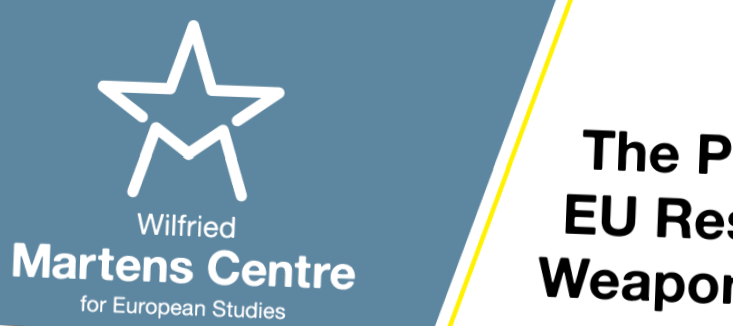(November 14, 2023 – Wilfried Martens Centre for European Studies, Brussels)
Speakers:
- Vladimír Šimoňák: Head of the Crisis Management Unit, Slovak Ministry of Foreign Affairs
- Lena Düpont : MEP, EPP Group, Member of LIBE Committee
- Evelina Gudzinskaitė : Director, Migration Department, Lithuanian Ministry of the Interior
Moderator:
- Vít Novotný: Senior Research Officer, Martens Centre
The aim of this conference, hosted by the Martens Centre, was to shed light on the challenges and perspectives surrounding the instrumentalization of migration flows, discuss the most effective strategies to tackle this issue, and provide additional insights following the publication of the policy brief “The Power of Opacity: EU Responses to Weaponised Migration” authored by Vladimír Šimoňák.
Manipulation of Migration Flows: Definition, Objectives, and Misconceptions
The instrumentalization of migration flows refers to the strategic exploitation of migrant movements for political, economic, or security purposes. This definition aligns closely with the legislative proposals submitted by the European Commission in 2021. According to the Commission, “instrumentalization of migrants” describes a scenario where ‘a third country incites irregular migratory movements into the Union by actively encouraging or facilitating the movement of third-country nationals towards external borders, from within or outside its territory, with the intention of destabilizing the Union or a member state”. Notable instances illustrating these situations include the migration pressure created at the Greek border with Turkey in early 2020 and the one orchestrated by the Lukashenko regime in autumn 2021. All these cases offer a comparative framework to assess successful and unsuccessful approaches. This is particularly relevant within the ongoing legislative context, as it helps to anticipate what might be effective in future crises.
Regarding motives, Evelina Gudzinskaitė – Director of the Migration Department at the Lithuanian Ministry of the Interior – emphasized that behind every instance of manipulated migration, there are organizers driven by specific goals, using it as a tool for exerting pressure and manipulation. While monetary motivations may seem straightforward, such as halting migrant flows with financial incentives, some instances are propelled by political agendas. For instance, in the case of Belarus, there were attempts to promote the Kremlin’s propaganda by purposefully directing migrants towards European borders, intending to test European democracy’s resilience and portray Europe as vulnerable. Despite these attempts, Evelina Gudzinskaite explained that Europe responded decisively. She also talked about challenging Europe’s stance on human rights by accusing it of hypocrisy, alleging that Europe proclaims to defend human rights but fails to provide asylum rights when confronted with large migrant flows. This tactic aimed to create chaos and division within Europe. However, according to Evelina Gudzinskaite, these attempts did not yield the desired outcome of division and chaos within Europe.
As an MEP from the EPP group, Lena Düpont highlighted a widespread lack of understanding within the EU regarding the existence and nature of ‘instrumentalized migration’. According to her, certain parliamentary groups fail to grasp fundamental aspects of this manipulation, viewing it narrowly and overlooking its broader security implications. She also stressed the urgency of recognizing that ‘individuals themselves are not the security threat; rather, it’s the manipulation of migration for political or hostile purposes that poses significant risks,’ advocating for better preparedness and acknowledging persistent challenges in ensuring universal recognition of this issue as a priority.
Key Findings from the Article: Between European Vulnerability and the Need for Unpredictability
The vulnerability of the European Union to the instrumentalization of migration is distinctive due to several geographical and geopolitical factors. In the policy brief, one significant aspect contributing to this vulnerability is the EU’s extensive land borders shared with openly hostile neighboring countries and a lengthy coastline along a narrow sea. These borders are shared with nations that may exhibit varying degrees of instability, hostility, or disengagement from cooperative agreements, amplifying the EU’s susceptibility to the strategic manipulation of migrant movements for political or disruptive purposes. That’s why Europe seems to be more vulnerable than others when the US or Australia, for example, don’t even work on this subject.
Vladimír Šimoňák highlighted that the unpredictability and opacity of European Union responses in addressing migration challenges are strategic advantages in countering the instrumentalization of migration. This uncertainty makes the EU less predictable in its responses to migration-related issues, serving as a deterrent to adversaries considering the use of migration as a political tool or means of pressure. Then, the lack of a rigid regulatory framework allows for more adaptable and effective responses to specific situations, rather than being bound by inflexible rules. According to him, the Commission’s proposal, besides not seeming very feasible politically, would be counterproductive. Finally, all the panelists agreed on the fact that maintaining this opacity is crucial as it allows the EU to retain a wide range of response options, offering flexibility in handling various scenarios. Evelina Gudzinskaitė’s perspective aligned with this idea. For her, this approach prevents adversaries from studying and exploiting known European procedures, enhancing the EU’s ability to counter hybrid attacks or manipulations based on knowledge of laws and procedures, which is, according to her, far from being anecdotal today.
Event description, documents and YouTube feed available on the website of the Martens Centre

